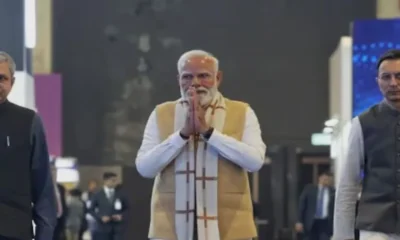The director of Nehru Memorial Museum and Library said on Monday that the NMML is expanding its ambit to include all Prime Ministers, despite a strongly worded letter written by former PM Manmohan Singh to Prime Minister Narendra Modi urging him to leave the Jawaharlal Nehru memorial complex in Delhi “undisturbed” out of respect for history and heritage.
Shakti Sinha, Nehru Memorial director, told CNN-News18, “It is correct that NMML is expanding its ambit very specifically to focus on Prime Ministers, though even now it is not limited to Nehru. What should be appreciated is that NMML has taken up the first ever upgradation of the Museum since it was set up over 50 years ago. The coverage of Nehru would be made much more comprehensive, thematically and made interactive.”
Rs 280 crore has already been sanctioned by the central government for the construction of the museum for all prime ministers, reported CNN-News18.
The plan is to build a museum for all prime ministers in the 25-acre estate (Teen Murti Bhavan complex). This will be separate from the existing structure of the Nehru Memorial.
The Congress is vehemently opposed to setting up a museum for all former PMs in the Teen Murti Bhavan complex, saying it would dilute the legacy of India’s first PM Jawaharlal Nehru.
At the NMML’s 43rd annual general meeting, Home Minister Rajnath Singh assured that the move of opening the museum of other PMs is not an attempt to dilute the legacy of India’s first prime minister Jawaharlal Nehru, who was in the office for 17 years.
Congress leaders Mallikarjun Kharge, Karan Singh and Jairam Ramesh, historian Nayanjot Lahiri and economist Nitin Desai took strong objection to the idea of a museum for all former PMs of the country to be built at the Teen Murti Bhavan complex which houses the Jawaharlal Nehru Memorial, Nehru Memorial Museum and Library (NMML).
Former PM Manmohan Singh, in his letter to PM Modi last week, said “Jawaharlal Nehru belongs not just to the Congress but to the entire nation.”
Dr Singh wrote that even during the BJP stalwart Atal Behari Vajpayee’s tenure as prime minister, “there was absolutely no attempt made to change the nature and character of NMML and Teen Murti complex in any way. But sadly, that seems to be part of the agenda of the government now.”
He quoted Vajpayee’s speech in Parliament when Nehru died. “As Atal Bihari Vajpayeeji himself said in his moving speech to Parliament when Panditji passed away: ‘Such a resident may never grace Teen Murti again. That vibrant personality, that attitude of taking even the opposition along, that refined gentlemanliness, that greatness we may not again see in the near future. In spite of a difference of opinion we have nothing but respect for his great ideals, his integrity, his love for the country and his indomitable courage’.”
Singh wrote: “Let us respect this sentiment and keep Teen Murti as a memorial to our first Prime Minister Pandit Nehru and leave the Teen Murti complex undisturbed as it is. This way we will be respecting both history and heritage.”
He wrote: “Jawaharlal Nehru belongs not just to the Congress but to the entire nation. It is in this spirit that I have written to you.”
Dr Singh said NMML is “dedicated to the memory of India’s first Prime Minister and the prime architect of the Indian nation-state, who left behind an indelible imprint on our country and indeed on the world.”
His distinctiveness and greatness have been acknowledged even by his opponents and rivals, he wrote.
The museum, said Dr Singh, must retain its primary focus on Nehru and the freedom struggle because of his unique role having spent almost ten years in jail between the early 1920s and mid-1940s. “No amount of revisionism can obliterate that role and his contributions,” he wrote.
Responding to the letter sent by Dr Singh, Shakti Sinha, the director of NMML said, “it is not clear how exhibiting photos, speeches of other Prime Ministers would harm Nehru’s legacy.”
“What NMML has decided to do is to increase its ambit and make it a centre for information and research on Prime Ministers. NMML is a national institute focusing on contemporary India. NMML is already much more than Nehru,” said Sinha, who took over as the director of NMML after Professor Mahesh Rangarajan resigned in 2016.
Sinha had been the private secretary of former PM Vajpayee and was also part of the Prime Minister’s Officer during his tenure.


 Latest world news18 hours ago
Latest world news18 hours ago
 Latest world news18 hours ago
Latest world news18 hours ago
 India News18 hours ago
India News18 hours ago
 Latest world news9 hours ago
Latest world news9 hours ago













